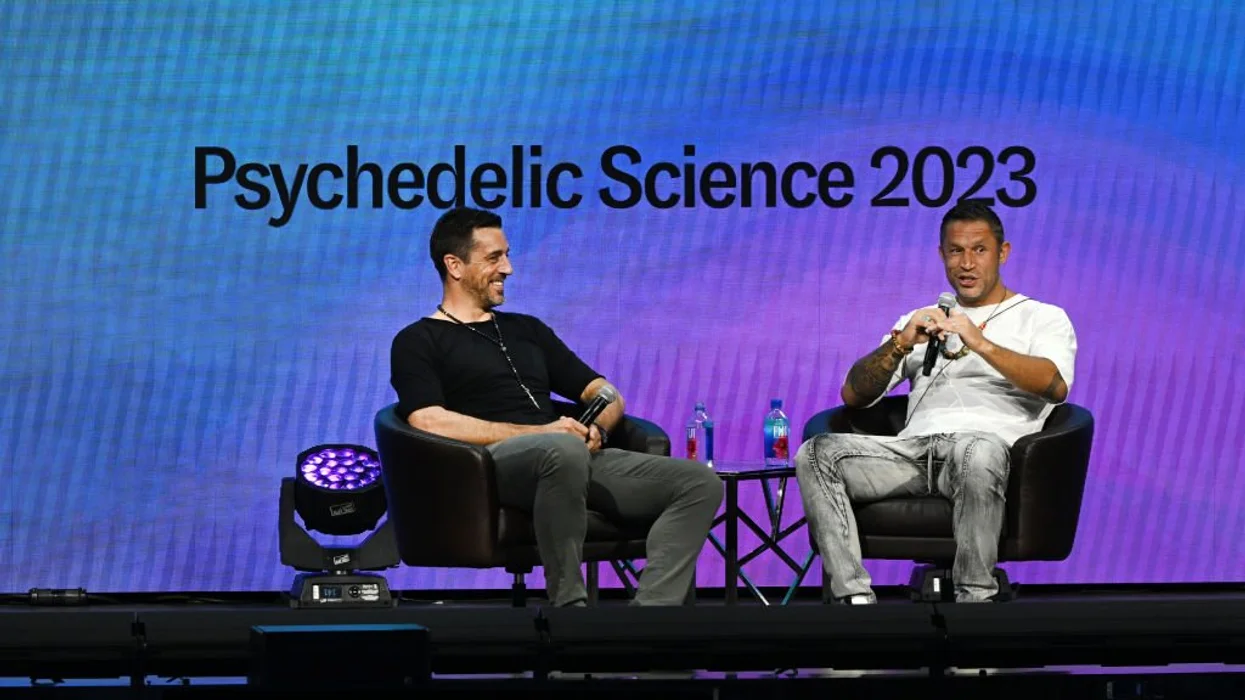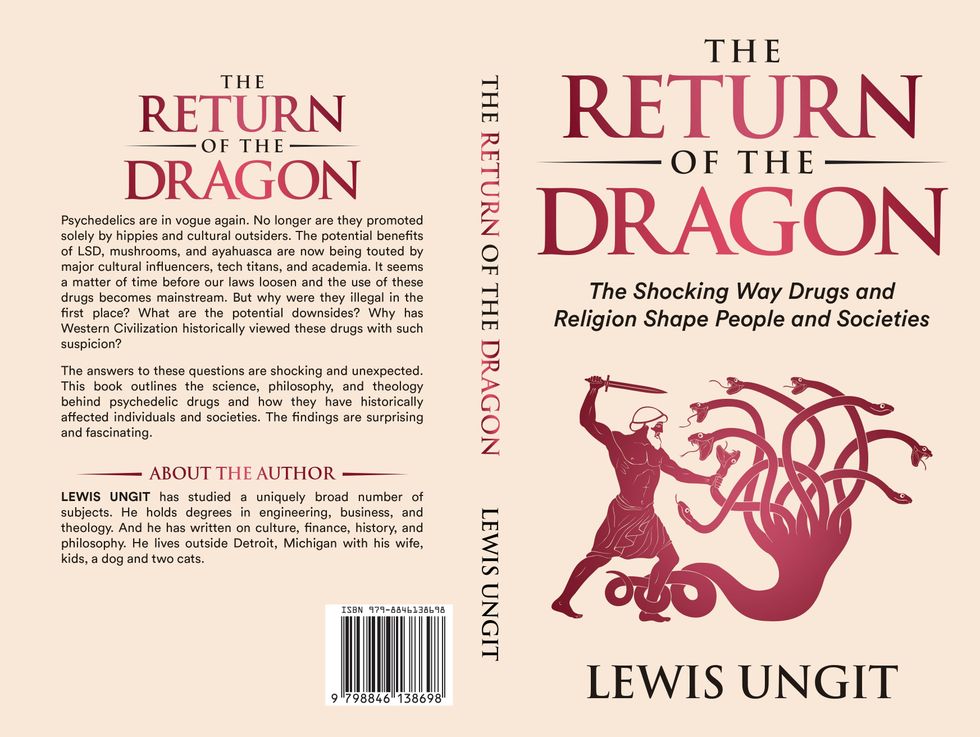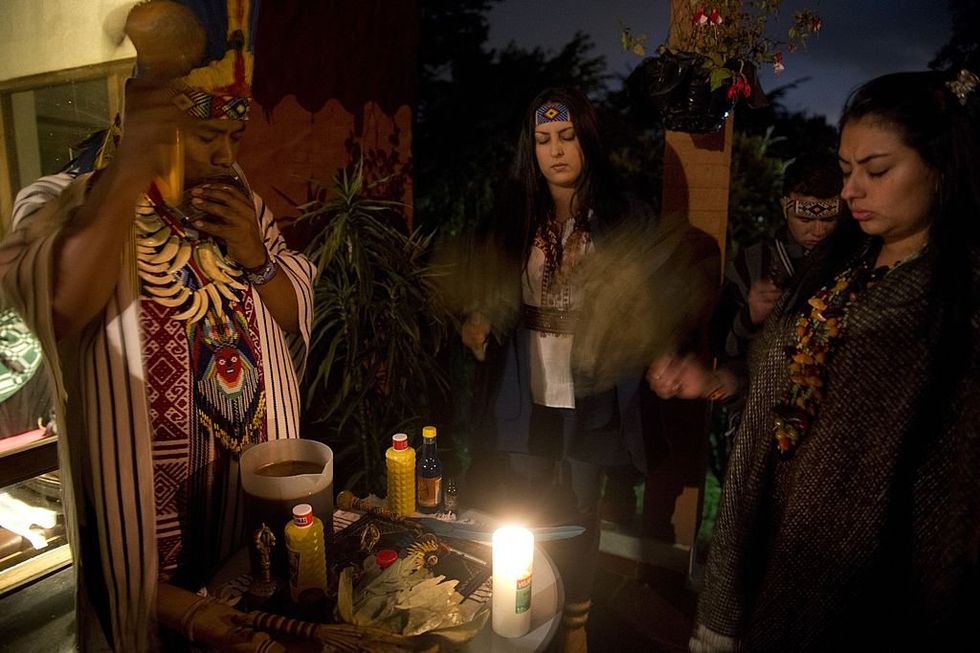
Getty Images/Helen H. Richardson/MediaNews Group/The Denver Post

Author Lewis Ungit talks about his research into the links between psychedelics and the occult and shares an excerpt from his book, "The Return of the Dragon."
Although Lewis Ungit released "The Return of the Dragon" a year ago, his book examining the links between psychedelics and the supernatural is more relevant than ever. So-called secular society continues to fill the post-Christian void with transhumanist fantasies and progressive utopian visions. Bitcoin bros "jokingly" reinterpret the second coming of Christ as the advent of artificial super intelligence. And everyone from prominent podcasters to suburban moms confront their demons in harrowing, healing ayahuasca ceremonies.
As evangelical writer Ben Zeisloft wrote on X yesterday in a post recommending Ungit's book:
There is a massive new tidal wave of religious activity surrounding psychedelic use about which very few evangelicals are thinking. For eons pagan religions have used psychoactive substances like ayahuasca to commune with otherworldly beings, from whom they claim to receive secret knowledge about the universe. This may be uncomfortable to admit for Western Christians, who are largely materialistic in our worldview along with other Westerners, but the Christian faith has long recognized these practices as risking contact with demons. Our secular neighbors, who are rapidly realizing materialism is false and that the world is both spiritual and physical, are now diving into these practices without warning from Christians.
I recently spoke to Ungit about what led him to this subject, the significance of the Greek word pharmakeia, and the strange goings on at the Large Hadron Collider. See the end of this interview for an excerpt of "Return of the Dragon."

ALIGN: I stumbled across your book a while back and found it completely engrossing. Could you talk about what led you to write it?
LEWIS UNGIT: I had drug experiences like a lot of people when I was younger and just kind of got away from it. Not necessarily because of any of the conclusions of my book; there were aspects of it I just didn't like.
Years later, I was talking to somebody and they said, "Hey, have you ever heard of this ayahuasca thing?" I had familiarity with LSD and mushrooms and mescaline and a lot of the other things that people take. But for whatever reason, ayahuasca had never come up in my social group.
So, I started to look into it a little bit and [found it] so interesting. The experiences people have when it comes to the geometry they see is all very similar. People talk about it looking like Mesoamerican, Aztec art. Incredibly similar across user groups.
If you're a rich hippie from the United States, you would expect your experience to be very different from what an indigenous person in Peru sees. But in reality, their experiences are amazingly similar.
I almost forgot about it for, for a little while. And then all of sudden it came up on, like, three different podcasts that I was listening to and it sparked my interest again.
One of the things that came up in those podcasts was [when] people talked about the entities that they saw while on ayahuasca, they said they were real. They would have this ayahuasca thing, see entities, come back and say, "Those things that I saw are still there and they're still real." And in some cases, they'd say they're more real than our reality. Like that was the reality. We're the dream.
And I found that to be fascinating. I started to read controlled studies that Johns Hopkins did and that NYU did and that the University of Wisconsin-Madison did. There's also a book called "The Spirit Molecule" that goes through some of these studies
The studies themselves are amazing. You go through them and see that a high rate of people both see these entities and think they're real. So, it wasn't just those couple of podcasts I listened to.
And it even sounded like some of the scientists doing these studies maybe thought some of this stuff was real, which for me was just mind-blowing.
Everyone assumes when you do drugs, you just mess with your brain chemistry and you go a little crazy, and then you come back to normal. But here you have sane, sober people who, whether they've done the drug or not, are saying "I think this is real." And so for me, the question became: "if these things are real, what are they?"
If the entities ayahuasca summons are real, who's to say they mean us well?
That's the genesis of the book. That's where I started to say, "Okay, well, let's look into the science. Let's look into the history. Let's look into what could be going on philosophically and theologically."
If you are open to taking what these people say seriously, I think there's no grounds to just reject it, especially given that you have very intelligent, otherwise perfectly sane people [making these claims].
ALIGN: You start with the myth of Pandora's Box and you trace this prohibition against tampering with these forces, which the Greeks called pharmakeia.
UNGIT: Yeah, that's the Koine Greek word for both drugs and for witchcraft. They don't have separate words. They went together in ancient thought. Witches and sorcerers used drugs as part of their process.
There's an author and researcher at Yale named Leslie Wilson who I've quoted fairly extensively in my book. He says in the ancient world — the ancient Near East — medicine, witchcraft, and religion really weren't separate things. There was this overlap. And that's why I think the word itself has that overlap Because the use of drugs for spiritual purposes or for magical purposes was ubiquitous in the ancient world.
ALIGN: The word pharmakeia pops up in the Bible as well, right?
UNGIT: Yes. In the Bible, there's extensive use of the word pharmakeia.
It's in the Greek translations of the Old Testament, which a lot of people don't know are actually the oldest available versions of the Old Testament. And it's most likely the Old Testament the apostles and Jesus himself would have used. And [the word is in] the New Testament, which was for the most part written in Greek.
Most English translations don't necessarily say "drugs for spiritual purposes." They'll use a word like "sorcery" or "necromancy" or something like that. But if you look up pharmakeia in a Greek lexicon, the word literally means the use of drugs for spiritual or magical purposes.
And the warnings about [it] in the Bible look unhinged on the surface. They'll say, "Those that practice pharmakeia are not worthy of life." "Those that practice pharmakeia will be cast out of God's presence." "Pharmakeia leads whole nations astray."
So, there's these warnings. Here you have Christianity that is almost unique among religions in having this extreme prohibition in its holy writings. And if you go back in Christian history and there's never been the use of drugs for spiritual purposes as you see in many, many other religions.
ALIGN: Although, I have seen people trying to link Christianity to drugs.
UNGIT: There have been several books, but one that came out recently is Brian Muraresku's "The Immortality Key." I responded to that a little bit in my book and have a much longer article on my Substack. If you watch Muraresku on Joe Rogan, he more or less admits in the end that there's no evidence [that early Christians used psychedelics]. And if you read "The Immortality Key," it's surprisingly lacking in evidence.
Not only that, there's evidence against it. If you read the earliest Church fathers, St. Ignatius, for example, or the Didache, which was written in 110 AD, you encounter these strong prohibitions against pharmakeia.

ALIGN: Aubrey Marcus had a friend on his podcast who is a seasoned ayahuasca-taker. She said something to the effect of, "Grandmother Ayahuasca and I made a contract that she could use my body for healing other people." Even if you don't believe in Satan, this obviously evokes a certain image. Why trust these entities?
UNGIT: One of the things that kept coming up in the personal ayahuasca accounts I've read is the word "possession." People would say "The entity possessed me. I felt I had to do its will." Obviously, possession is a terrifying thing in Christian theology.
But among some of these people there's a deep ignorance of that. I don't know if it's true ignorance or just a willful ignorance, but it's an ignorance that could be a risk.
I quote Graham Hancock in my book. He's a big promoter of ayahuasca. He's talked about the fact that he's gone down to the Amazon and done several ayahuasca ceremonies with indigenous people there. And when he does ayahuasca, he says he meets Mother Ayahuasca. And he says she's a serpent or a serpent-human hybrid and that this is something many people experience. Again, why are people seeing the same thing? How does that make sense if it's a brain phenomenon?
ALIGN: Do you see this through a Christian cosmology? Are you Christian?
UNGIT: I am. Yeah, so, I definitely do. And, you know, I tried to write my book in such a way that you didn't have to be Christian to go along with it. I kept it somewhat neutral or objective to the extent that you can, even though I don't think that's fully possible to be neutral when you're talking about things like religion.
But for me personally, that's the most terrifying part of this. Because I do look at it from a Christian perspective and I do think that there is such thing as the demonic, there is such thing as dark entities that want to do harm to human beings, and I do think that's what you're experiencing, sometimes at least, when you take drugs for spiritual purposes.
We talk about the hippies as normalizing drugs, but in reality, the major increase in drug use has been in just the last 20 or 25 years. In the case of marijuana, you've got a majority of young people who have done it and a lot of people are using it heavily.
But then you also have things like ayahuasca, things like LSD, things like mushrooms that are just becoming more and more popular and larger and larger percentages are trying it. And so for me, if by doing these drugs people are encountering entities that we would describe as demonic, how terrifying is that you have a majority of young people doing them?
And that's why I started my book with that example of Pandora's Box. She opens the box, and you can't get it closed again, right? That's what we as a society are doing — we're opening a box that I don't know [whether] we'll be able to close.
It seems like it's become even more normal than when I was writing the book. It seems like it's become even more mainstream. I live in Michigan, and you can drive around and see billboards promoting pot everywhere you go. I tell my kids, "When I was a kid, the billboard said 'don't do drugs.'"
ALIGN: Same here.
UNGIT: Now, all the billboards say, "Do drugs." It's a giant shift that we've undergone.
ALIGN: And we have all these people pushing psychedelics as a force for good. We're going to cure mental illness, cure fear of death. I know they'll use mushrooms and things like that in hospice.
UNGIT: Right. Imagine you're facing death. These are the last moments of your life. Most people say get right with God, right? And in that moment, you're going to take something that, if my premise is correct, instead of getting you right with God helps you interact with the demonic. So, that's a pretty dark thing.
ALIGN: Did you have a conversion experience? Were you raised Christian?
UNGIT: I was raised Catholic and then fell away completely for a while. And then when I was in my 20s, came back to the Church.
ALIGN: To me, the existence of the demonic is one of the better arguments for the existence of God.
UNGIT: Yeah, yeah, well, it's interesting. Since writing the book, I've read a bunch of stuff on the government working with the paranormal. A lot of people don't realize the CIA had a giant paranormal program going from the 1960s all the way up into the 1990s. And our government basically came to the conclusion that it was real. They didn't abandon the program because it was fake.
And, again, if it's real, what are you interacting with? And it seems like people don't ask that question. They just assume it's not real. And the whole idea that maybe this is real doesn't even cross their minds.
ALIGN: Would you consider yourself an independent scholar? Do you have a day job?
UNGIT: Yeah, I do work in industry for a private business. I feel like writing on a subject like this, you can't be a scholar at a university. That's part of the problem with modern scholarship is that you write on the wrong thing, and your career is over. And so I think it's the people independently researching who are doing the best work right now. I don't think it's people on staff at universities.
ALIGN: I agree, and part of Align's interest is in covering people building alternative institutions or doing it themselves. And your book doesn't make outlandish claims. It's very well-written, very soberly written, and it backs it up your claims with sources. So, you self-published it?
UNGIT: Yes. My personal background is I have a seminary degree, I have a business degree, and I have a engineering degree. But I worked with some other guys who have master's degrees in philosophy and other backgrounds who were helpful for me as I was developing these ideas.
And then I just read extensively. Like you mentioned, I tried to cite every claim I made. And the bibliography is extensive. So, I did my best to tell the reader, hey, you don't have to trust Lewis on this. Here's a study from Johns Hopkins.
My approach was just to say, here's what the scholarship says, here's what the history says, here's the primary sources or the secondary sources and allow people to come to their own conclusions.
ALIGN: Did you have people to give you feedback during the writing process?
UNGIT: Yeah, I have a good circle of friends that helped with the book, and helped me fact-check. I had a good editor as well.
ALIGN: It's published through Amazon?
UNGIT: Yeah. Honestly, if you're going to self-publish, that's the way to go. Because they'll do the paperback, they do the Kindle, you can do a hardcover, you can do the audiobook. So, I had an audiobook done as well. They make it very convenient for you.
ALIGN: How did you market the book?
UNGIT: I I sent Mike Cernovich a copy of it, and he tweeted it out. That was a nice boost at the beginning. From there, I did a bunch of different podcasts. I probably did a hundred podcasts when it was all said and done. "Haunted Cosmos" did a whole episode on it, and that's when it hit number one in its category on Amazon. So very, very cool.
ALIGN: So, do you have any other other books in the works?
UNGIT: I'm currently working on a book looking at artificial intelligence and technology in the same way I look at psychedelics in "Return of the Dragon."
The supernatural is incredibly present in the history of tech, especially in the nascent [development of] the internet, computers, smartphones. [A large] number of people were doing weird spiritual stuff, including psychedelics, at that time in Silicon Valley.
ALIGN: What do you think about the conspiracy theories surrounding CERN?
UNGIT: I think there's something weird going on with that. For people who don't know, CERN is the biggest scientific organization in the world. I think they have thousands of employees, they have a seat on the U.N. And when they opened up one of the tunnels for this atom smasher [the Large Hadron Collider] they did a ceremony where they had pagan gods dancing around. It was very weird.
So, that's one piece. And then the other thing was a clip from a guy who was taking video out the window of his hotel room, and there's all these people in cloaks, kind of an "Eyes Wide Shut" situation. And they're sacrificing this woman. And, you know, they said it was a joke. They said it wasn't real. But anyway, that video came out, and so, there's certainly weird, weird stuff associated with that.
There are so many examples like that when you look at the history of tech. CERN is partially responsible for developing the worldwide web. These are the sorts of people running things. Look at the development of rockets and the space program. They were [deep into] the occult. Jack Parsons gave up his college career so he could join a cult, and he's the guy that developed the entire rocketry program for the U.S.
ALIGN: Well, that sounds fascinating. I look forward to reading the next book. Best of luck to you and thank you, Lewis, for your time.
UNGIT: Thanks, man. Appreciate it. Good talking to you.
Click here for an excerpt of "Return of the Dragon," courtesy of Lewis Ungit.
Lewis Ungit lives in Michigan with his family. His book, "The Return of the Dragon," is available here. He also writes on his Substack.